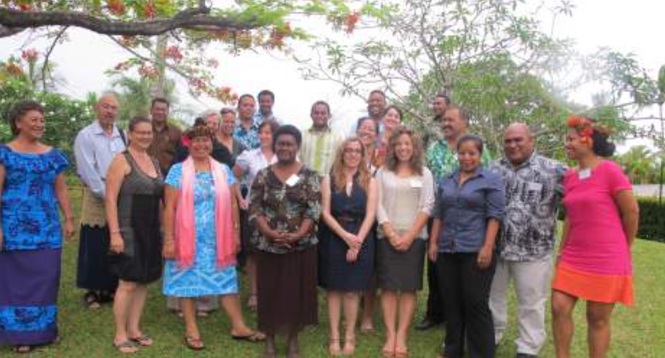
As a group of isolated, small island states, the Pacific is presented with serious logistical challenges to the delivery of international disaster relief. Ensuring a rapid and effective response is an overriding objective in any disaster situation in this region. It is imperative, therefore, that Pacific states be legally prepared to facilitate and regulate international disaster response efforts, to ensure that disaster affected populations receive the assistance they need.
Pacific Island leaders met in August 2012 at the 43rd Pacific Islands Forum Leaders meeting, where they discussed key issues of importance to their region. The outcome of this meeting included a call to Pacific states to utilize the “Guidelines for the domestic facilitation and regulation of international disaster relief and initial recovery assistance” (“IDRL Guidelines”) to strengthen their national policy, institutional and legal frameworks, in collaboration with their National Red Cross Societies, IFRC, the United Nations and other relevant partners.
It was against this backdrop that the IFRC’s Disaster Law and Humanitarian Diplomacy programmes, in collaboration with the Pacific Islands Forum Secretariat (PIF), convened a regional workshop in Nadi, Fiji to explore questions of disaster preparedness and identify opportunities for cooperation between National Societies and their governments, as well as with international and regional organisations such as the PIF. Over the course of two days, participants discussed their experiences in disaster management and response, with an emphasis on the facilitation of international assistance.
Ms. Lorraine Mangwiro, Head of the IFRC Pacific Regional Office, noted the timeliness of the workshop, given the importance placed on IDRL at the 43rd Pacific Islands Forum. Her remarks were reiterated by Lorraine Kershaw, the International Legal Advisor for PIF. Ms. Kershaw highlighted the workshop as an important vehicle for progressing IDRL in the region. “Through this”, she stated, “the Pacific has demonstrated its dedication to meeting the needs and interests of vulnerable people affected by disasters.”
The workshop was attended by representatives from National Red Cross Societies, Pacific Governments, tertiary institutions, regional organisations and RCRC movement partners. Country case studies on improving IDRL were presented by the Cook Islands, Vanuatu and New Zealand Red Cross Societies, followed by the sharing of government perspectives.
The Head of Emergency Management in the Cook Islands, Mr. Charles Carlson, emphasized the need to ensure effective implementation of disaster response legislation. This was echoed by Ms. Gabrielle Emery of the New Zealand Red Cross, who, during her presentation on the response to the 2011 Christchurch earthquake, emphasized that while comprehensive national laws may be in place at the time of disaster, they can be meaningless if not exercised or disseminated enough to ensure an effective response.
During the final afternoon of the workshop, participants put together ‘plans of action’ to take back to their government and Red Cross Red Crescent colleagues, which outlined a path towards improving IDRL in each country.
The Pacific is on its way to becoming a regional exemplar in legal preparedness for disasters. If they incorporate IDRL into their national legal regimes, Pacific islands states can ensure that much-needed disaster relief is facilitated as swiftly as possible, and regulated in line with international humanitarian standards. This workshop served as an opportunity for recognising the necessity of this, and a step towards achieving it.